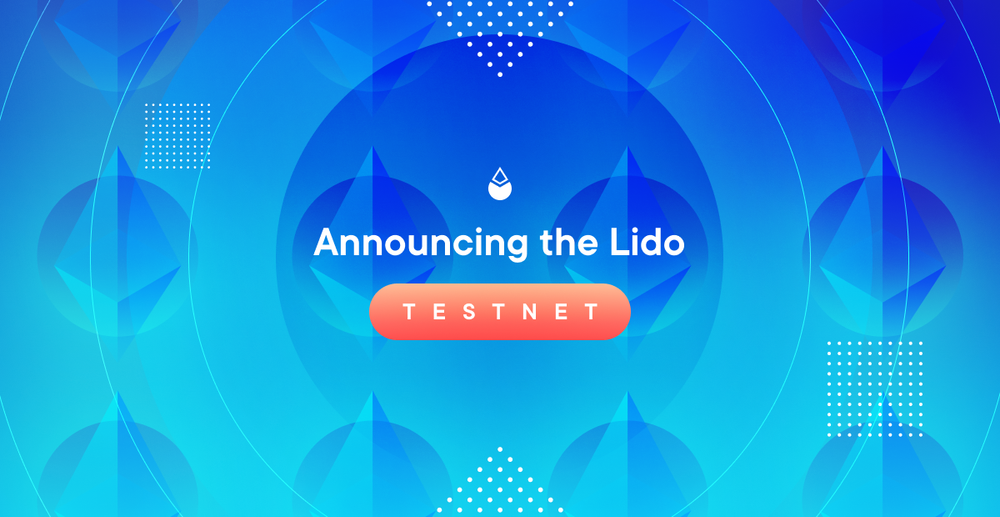Lido Testnet Launch

Lido is a liquid Ethereum staking solution letting you earn staking rewards with no lock-ups or minimum deposits whilst contributing to the security of the Ethereum 2.0 chain.
We're thrilled to announce the launch of the Lido protocol testnet, which allows users to stake and convert testnet ETH to staked ETH(stETH). With this also comes the test launch of the Lido DAO governance tools for the Ethereum staking service.
Testnet Objectives
The testnet launch sees the deployment of contracts - on Goerli testnet - to test Lido in dynamic conditions and gain operational experience for participants. An added bonus is that the testnet will demonstrate the simplicity of staking Ethereum with Lido.
Objectives with respect to Lido over the coming weeks are to:
- Perform distributed key generation ceremony for withdrawal credentials, which will hold all Lido's staked ether;
- Deploy the Lido DAO, distribute governance tokens, and set up all necessary parameters via DAO members voting procedures;
- Assign and launch oracles, which are responsible for reporting cumulative Lido balances on the Ethereum 2.0 beacon chain to the smart contract;
- Assign node operators to whom staking on the Ethereum 2.0 beacon chain will be delegated; and
- Start accepting ether deposits in Goerli and check Lido’s operations.
In addition to showcasing what has been developed, this testnet launch is an opportunity for Ethereum validators to demonstrate their expertise. Lido stakes through a set of proven validators and, in order to guarantee performance, the validators are best-in-industry.
Testnet Roadmap
The roadmap for the coming week is as follows:
Wednesday | Nov 25
- The first Lido signature generation ceremony is conducted.
- The final testnet version of the protocol is deployed.
- The DAO Token Holder Manual is published.
- DAO holders vote for initial protocol parameters and for the inclusion of Node Operators and Oracles.
At this point, the protocol is ready to accept user funds. There will be a quick run for working validators to earn revenue as early as possible, given the clog in Pyrmont validator entry queue.
- A Node Operator with 10 signing keys will be added and accepted by the DAO with the testnets orchestrators (combined, testnet orchestrators votes will reach the quorum to ensure the test run will run to completion).
- The testnet orchestrators will perform DAO voting for setting the withdrawal credentials chosen during the ceremony.
- Testnet orchestrators will submit 320 ETH and use the protocol to deposit them using the keys submitted in the first step.
- One node operator is needed to assist with running that first validator node — please let us know if you’re willing to help.
Thursday | Nov 26
- The second, text-based, signature generation ceremony is started. This ceremony will last until Tuesday, Dec 1. It won’t be used in the testnet, just generated.
- Node Operator and Oracle manuals are published.
- Oracle Committee Members deploy oracle daemons (at least 5 Oracle Committee Members).
- Node Operators generate and submit signing keys (100 keys each, at least 6 operators).
- Node Operators deploy validator clients for the submitted keys.
Friday | Nov 27
- DAO token holders vote for accepting the signing keys submitted by Node Operators.
- DAO token holders initiate depositing the received and buffered user funds to the Beacon chain.
Saturday | Nov 28
- Monitoring the system working as intended and performing more deposits.
Monday | Nov 30
- Testing integration with Uniswap v1.
Testnet Resources
If you are interested in Lido’s progress or to try out testnet staking with Lido, please refer to the following resources:
- Lido: Ethereum Liquid Staking - A Primer
- Lido Github Repo
- Developer Chat Support
- Lido DAO Member Manual
Established operators including @CertusOne, @ChorusOne, @P2PValidator, @stakefish & @StakingFac will join Lido as validators to launch liquid staking on Ethereum. https://t.co/JOpq7egKrT
— Lido (@lidofinance) November 18, 2020
If you are an experienced validator interested in contributing to Lido, please get in touch. To register your interest in staking with Lido, let us know.